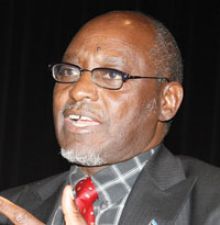SADC to investigate MDC military camps in Botswana
Staff Writer | Friday December 5, 2008 00:00


The investigating team was appointed following a November 5, meeting of the Organ Troika held in Maputo, Mozambique, in which Zimbabwe lodged a complaint that Botswana was giving military training to youth from the opposition MDC-T to fight the government.
Botswana has consistently dismissed such claims, inviting the SADC commission to come and investigate. The investigating team's terms of reference (ToR) were approved at the SADC Extra-Ordinary Summit held in Johannesburg on November 9. Slightly over a week later, the team started its investigations in Gaborone.
Zimbabwe expects the investigating team and Botswana representatives to attend what was described as 'stage-managed witness presentations' in Harare, a SADC diplomat noted. This is not part of the terms of reference, Botswana cautioned.
The ToRs were based on Zimbabwe's charge that Botswana has bases at which Mugabe's opponents are being trained. The team's terms are basically to establish the existence of such bases and related training programmes.
The head of the investigating team, Dr. John Kunene confirmed yesterday that they would be on a two-day visit to Botswana next week. Kunene, the principal secretary in Swaziland's Ministry of Defence, added that the team would subsequently submit a final report to the SADC Interstate Defence and Security Committee of the Organ Troika.
The committee might decide to expeditiously convene an extraordinary meeting to review the findings, he added. Swaziland currently holds the rotating chair of the SADC Organ on Politics, Defence and Security.
The relations between Botswana and Zimbabwe took another turn since President, Ian Khama became head of state last April. Khama's administration broke ranks with the 'silent diplomacy' brigade that characterised SADC.
Robert Mugabe's daylight robbery of the June 28 presidential run-off elections appears to have been the last straw in what remained of the neighbouring countries' relations. Botswana made it clear it could not recognise the unfair and violent poll that brought Mugabe back to power.
After initially boycotting the August SADC ExtraOrdinary Summit in Johannesburg, Khama was coerced to attend the Thabo Mbeki engineered power-signing agreement ceremony held in Harare of October 15. That agreement has since turned out to be a farce due to Mugabe's resolute reluctance to genuinely share power.
Prior to the latest power sharing talks held in South Africa last month, Botswana proposed that because of the continued impasse, SADC should consider calling for fresh presidential elections in Zimbabwe, this time, under the supervision of SADC, African Union and United Nations.
This proposal rubbed the Mugabe administration the wrong way, describing it as provocative.
Kunene, however, could not rule out this option should the impasse persist. 'If there is no breakthrough, then obviously the region will have to explore other options, such as the involvement of the AU and the UN'.
Another round of Zimbabwean power sharing talks could be expected next week. The chief director, Africa Multilateral in the South African Foreign Ministry, Ajay Bramdeo, indicated that for now, attention has temporarily turned to the cholera outbreak in Zimbabwe, and the accompanying economic crisis.
'Efforts are ongoing to try and break the last hurdle on the way to a permanent solution,' he added.
